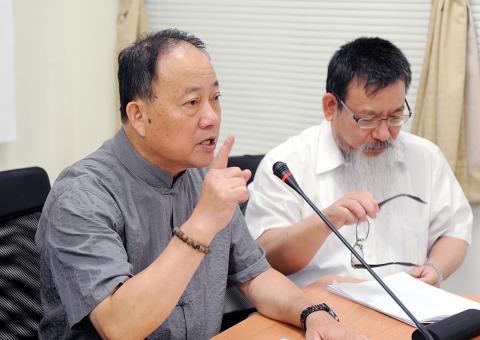Former People First Party (PFP) legislator Lin Cheng-er (林正二), who was found guilty of vote-buying earlier this month, yesterday vowed to file an extraordinary appeal or seek a retrial to clear his name in what the party called a “politically motivated ruling.”
Lin was stripped of his seat after the Supreme Court on Thursday last week upheld the ruling of a second trial that found him guilty of vote-buying during his 2007 campaign.
The charges relate to his hosting a party in November 2007 to recruit campaign staffers, for which he received a 20-month jail sentence and was deprived of his civil rights for 17 months.

Photo: Lo Pei-der, Taipei Times
Three of his assistants were sentenced to 19 months in jail and deprived of their civil rights for one year for their role in setting up the party.
“We are all Aborigines. We don’t deserve such heavy punishment for hosting a party, which cost just NT$13,800. I just feel heart-wrenched,” a teary-eyed Lin said.
Judges said in the ruling that Lin was found guilty because the expensive fare served at the party — including lobster, shark fin and crab — could have swayed the 16 invited guests.
Lin said that while he was seeking re-election at the time, but had not yet been nominated by the PFP, so the party was not a trade-off for votes.
PFP Deputy Secretary-General Liu Wen-hsiung (劉文雄), as well as PFP legislators Thomas Lee (李桐豪) and Chen Yi-chieh (陳怡潔), voiced their support for Lin, saying they had reason to suspect that the Chinese Nationalist Party (KMT) had a hand in influencing the ruling.
“Lin was ruled guilty because he was not a registered KMT [member]. Lin lost his seat in 2010 after the court nullified his election in the Seventh Legislature for the same case. How come he was punished again in the Eighth Legislature when he was elected legally?” Liu asked.
Taiwan High Court judges at the second trial overruled the previous ruling, which found Lin not guilty, but did not present new evidence, Liu said.
That raises the question of whether the verdict was the result of “political manipulation,” Liu added.
Democratic Progressive Party Legislator Gao Jyh-peng (高志鵬), who was at the press conference, also threw his support behind Lin, saying he knew how Lin felt.
Last month, Gao was sentenced to seven-and-a-half years in prison for his part in a land deal scandal involving a former aide.
Gao has maintained his innocence and said he knew nothing about how his assistant handled the land deal. He has vowed to file an appeal.

The High Prosecutors’ Office yesterday withdrew an appeal against the acquittal of a former bank manager 22 years after his death, marking Taiwan’s first instance of prosecutors rendering posthumous justice to a wrongfully convicted defendant. Chu Ching-en (諸慶恩) — formerly a manager at the Taipei branch of BNP Paribas — was in 1999 accused by Weng Mao-chung (翁茂鍾), then-president of Chia Her Industrial Co, of forging a request for a fixed deposit of US$10 million by I-Hwa Industrial Co, a subsidiary of Chia Her, which was used as collateral. Chu was ruled not guilty in the first trial, but was found guilty

DEADLOCK: As the commission is unable to forum a quorum to review license renewal applications, the channel operators are not at fault and can air past their license date The National Communications Commission (NCC) yesterday said that the Public Television Service (PTS) and 36 other television and radio broadcasters could continue airing, despite the commission’s inability to meet a quorum to review their license renewal applications. The licenses of PTS and the other channels are set to expire between this month and June. The National Communications Commission Organization Act (國家通訊傳播委員會組織法) stipulates that the commission must meet the mandated quorum of four to hold a valid meeting. The seven-member commission currently has only three commissioners. “We have informed the channel operators of the progress we have made in reviewing their license renewal applications, and

Taiwan People’s Party (TPP) Chairman Huang Kuo-chang (黃國昌) yesterday appealed to the authorities to release former Taipei mayor Ko Wen-je (柯文哲) from pretrial detention amid conflicting reports about his health. The TPP at a news conference on Thursday said that Ko should be released to a hospital for treatment, adding that he has blood in his urine and had spells of pain and nausea followed by vomiting over the past three months. Hsieh Yen-yau (謝炎堯), a retired professor of internal medicine and Ko’s former teacher, said that Ko’s symptoms aligned with gallstones, kidney inflammation and potentially dangerous heart conditions. Ko, charged with

Taiwan-based publisher Li Yanhe (李延賀) has been sentenced to three years in prison, fined 50,000 yuan (US$6,890) in personal assets and deprived political rights for one year for “inciting secession” in China, China's Taiwan Affairs Office spokesman Chen Binhua (陳斌華) said today. The Shanghai First Intermediate People’s Court announced the verdict on Feb. 17, Chen said. The trial was conducted lawfully, and in an open and fair manner, he said, adding that the verdict has since come into legal effect. The defendant reportedly admitted guilt and would appeal within the statutory appeal period, he said, adding that the defendant and his family have